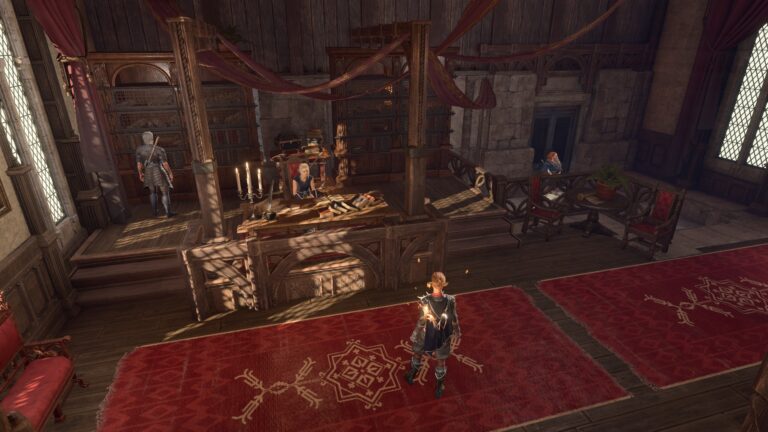In the immersive world of Baldur’s Gate 3, the House of Grief stands as one of the most intriguing and ominous locations players can explore. This sinister establishment, shrouded in darkness and mystery, offers a rich narrative experience that delves into themes of loss, sorrow, and malevolence. As players navigate through its shadowy halls, they encounter a myriad of challenges and revelations that test their resolve and uncover deep-seated secrets about the world of Faerûn. This article will provide a comprehensive exploration of the House of Grief, examining its lore, key characters, quests, and the thematic elements that make it a pivotal part of Baldur’s Gate 3.
The Lore Behind the House of Grief BG3
The House of Grief BG3 is deeply rooted in the lore of the Forgotten Realms, a universe created by Ed Greenwood that has served as the backdrop for countless Dungeons & Dragons campaigns. This establishment is dedicated to the goddess Shar, the Mistress of the Night, who embodies darkness, loss, and forgetfulness. Shar’s influence permeates every corner of the House of Grief, from its architecture to the behavior of its inhabitants. The lore suggests that the House of Grief serves as a sanctuary for those who have suffered great losses and seek to drown their sorrows in the embrace of darkness. However, it is also a place where Shar’s followers plot and scheme, using grief as a tool to manipulate and control others.
Key Characters in the House of Grief
The House of Grief is populated by a cast of complex and multifaceted characters, each with their own motives and backstories. Among the most notable are the High Priestess of Shar, who oversees the activities within the house and ensures that Shar’s will is carried out. Her enigmatic presence and cryptic dialogue create an aura of unease and anticipation. Additionally, players encounter other followers of Shar, each grappling with their own grief and inner demons. These characters add depth to the narrative, providing players with insights into the various ways grief can manifest and impact individuals.
Quests and Challenges
The House of Grief presents players with a series of quests and challenges that test their skills and moral compass. These quests often involve navigating through labyrinthine corridors, solving intricate puzzles, and making difficult decisions that can have far-reaching consequences. For instance, players may be tasked with retrieving a lost artifact that holds significant emotional value or confronting a powerful entity that feeds on sorrow. The choices made during these quests can influence the outcome of the story, leading to multiple possible endings that reflect the player’s actions and decisions.
Thematic Elements and Symbolism
The House of Grief is rich in thematic elements and symbolism, which contribute to its haunting atmosphere. The pervasive darkness within the house symbolizes the all-consuming nature of grief, while the various traps and obstacles represent the challenges individuals face when dealing with loss. The use of shadows and dim lighting creates a sense of foreboding, mirroring the internal struggles of the characters. Additionally, the presence of mirrors and reflective surfaces throughout the house serves as a metaphor for self-reflection and the idea that one must confront their own grief in order to move forward.
Player Choices and Consequences
One of the defining features of Baldur’s Gate 3 is its emphasis on player choice and the impact of those choices on the narrative. Within the House of Grief, players are faced with numerous decisions that can alter the course of their journey. These choices range from seemingly minor interactions with NPCs to significant moral dilemmas that challenge the player’s values and beliefs. The consequences of these choices are far-reaching, affecting not only the player’s character but also the world around them. This dynamic storytelling approach ensures that each playthrough of the House of Grief is unique and personalized.
The House of Grief’s Impact on the Overall Narrative
The events that unfold within the House of Grief have a profound impact on the overarching narrative of Baldur’s Gate 3. The revelations and discoveries made within its walls can shed light on larger conspiracies and conflicts within the world of Faerûn. Additionally, the player’s experiences in the House of Grief can influence their relationships with other characters and factions, altering alliances and enmities. This interconnectedness of narrative elements highlights the significance of the House of Grief within the game’s story and underscores its role as a pivotal location in the player’s journey.
Conclusion:
The House of Grief in Baldur’s Gate 3 is a testament to the game’s masterful storytelling and intricate world-building. Its rich lore, complex characters, and challenging quests create an immersive and emotionally resonant experience for players. By exploring themes of loss and sorrow, the House of Grief offers a poignant reflection on the human condition and the ways in which individuals cope with grief. As players navigate its dark and twisting corridors, they are drawn into a narrative that is both captivating and thought-provoking, solidifying the House of Grief as one of the standout features of Baldur’s Gate 3.

1 Comment
Can you be more specific about the content of your article? After reading it, I still have some doubts. Hope you can help me.